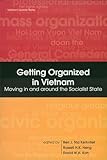Getting Organized in Vietnam : Moving in and around the Socialist State / ed. by Ben J. Tria Kerkvliet, Russell Hiang-Khng Heng, David Wee Hock Koh.
Material type: TextPublisher: Singapore : ISEAS Publishing, [2003]Copyright date: ©2003Description: 1 online resource (288 p.)Content type:
TextPublisher: Singapore : ISEAS Publishing, [2003]Copyright date: ©2003Description: 1 online resource (288 p.)Content type: - 9789812302359
- 9789812305930
- 361.709 23
- HS81.V5 A47 2001
- online - DeGruyter
| Item type | Current library | Call number | URL | Status | Notes | Barcode | |
|---|---|---|---|---|---|---|---|
 eBook
eBook
|
Biblioteca "Angelicum" Pont. Univ. S.Tommaso d'Aquino Nuvola online | online - DeGruyter (Browse shelf(Opens below)) | Online access | Not for loan (Accesso limitato) | Accesso per gli utenti autorizzati / Access for authorized users | (dgr)9789812305930 |
Frontmatter -- Contents -- Preface -- Abbreviations -- Introduction: Grappling with Organizations and the State in Contemporary Vietnam -- 1. From Fence-Breaking to Networking: Interests, Popular Organizations, and Policy Influences in Post-Socialist Vietnam -- 2. Business Associations and Policy-Making in Vietnam -- 3. NGOs and Highland Development: A Case Study in Crafting New Roles -- 4. The Disabled and Their Organizations: The Emergence of New Paradigms -- 5. Authoritarian Governance and Labour: The VGCL and the Party-State in Economic Renovation -- 6. The Relationship between Civic and Governmental Organizations in Vietnam: Selected Findings -- 7. Donors, Local Development Groups and Institutional Reform over Vietnam’s Development Decade -- Index -- About the Contributors
restricted access online access with authorization star
http://purl.org/coar/access_right/c_16ec
From the late 1950s in the north, to the 1970s until the mid-1980s in the south, there was little room or opportunity to form non-state voluntary organizations and associations in Vietnam. With few exceptions, only those established by the Communist Party and other state agencies were permitted.The picture has changed considerably since doi moi. From proactive self-help associations for the disabled to mass, semi-state or “non-governmental” organizations, the Vietnamese people are getting together to voice their collective and specific interests vis à vis the state. The process of getting together, voicing ideas, acting in concert, and attempting to influence policy in some cases is ongoing and in constant flux. This book presents original case studies of the gamut of organizations in Vietnam today and analyses their relationships with umbrella state organizations which are themselves evolving. Getting Organized in Vietnam also constitutes an enquiry into the term “civil society” itself. The contributors examine current thinking about the nature of the state in Vietnam in particular. Included here are the first attempts to provide a framework for assessing and categorizing the bewildering array of small organizations in Vietnam: which ones are weakly connected to the state, which ones are independent of the state but perhaps dependent on outside funding agencies. This book is a must for scholars, policymakers, journalists and others interested in understanding political and social change in Vietnam and other transitional economies.
Mode of access: Internet via World Wide Web.
In English.
Description based on online resource; title from PDF title page (publisher's Web site, viewed 01. Dez 2022)


